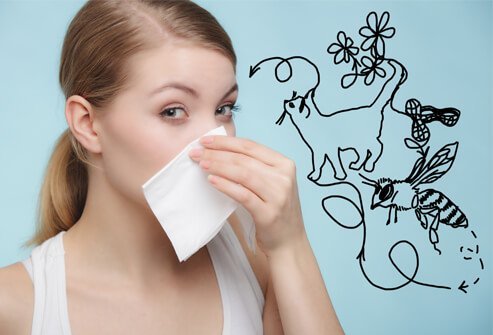
Fall allergies can cause symptoms such as sneezing, congestion, and sinus headache. Learn more about causes, treatment, and prevention of fall allergies
The fall allergy season usually lasts from August to November. For people who are sensitive to mold and ragweed pollen, fall allergies can be extremely severe.
Fall allergies can cause symptoms similar to sinus infections, including sinus headaches. When allergies flare up, your sinus and nasal mucus linings become swollen, resulting in sinus pressure and discomfort.
How to tell if your sinus headaches are caused by fall allergies
Fall allergy symptoms often include:
Symptoms of fall allergies and sinus infections are often similar. However, you can distinguish between the two by paying close attention to your symptoms:
- Itchiness is not a frequent symptom of a sinus infection
- High amounts of yellow or green nasal discharge is more likely to be a sign of a sinus infection than of allergies.
If you are still unsure whether your sinus headaches and congestion are caused by allergies or a bacterial infection such as sinusitis, contact your doctor for diagnosis and treatment.
What causes fall allergies?
- Pollen: Ragweed is the most prevalent cause of fall allergies, leading to episodes of allergic rhinitis or hay fever. These plants release fine, powder-like pollen into the air. This pollination peaks in mid-September, but it can keep patients with allergies sniffling and itching for weeks if not months. Other weed pollen, such as pigweed, dock, sorrel, and lamb’s quarters thrive in September when grass pollen resurfaces.
- Mold: Mold grows in moist areas and may grow in wet areas outside, especially where there are piles of damp leaves.
- Dust mites: When the weather grows colder and you start to use your heater more indoors, it can cause dust mites to get stirred into the air. Dust mites can trigger allergy symptoms and lead to sneezing and runny noses.
- Pet dander: Spending more time indoors can cause you to be more exposed to pet dander from your furry friends.
- School: As children go back to school, they may be exposed to more allergens such as mold and dust mites.
How are fall allergies treated?
If you suffer from fall allergies, an ear, nose and throat (ENT) physician can help you identify your triggers and determine the best treatment to keep them under control.
- Medications: For some people, using antihistamines, decongestants, eye drops, and nasal sprays can help relieve symptoms. Neti pots can also help flush out your nose and clear out mucus buildup.
- Allergy shots: Those who have more severe symptoms or whose allergies that interfere with their daily lives may benefit from immunotherapy, sometimes called allergy injections.
- Essential oils: Using diffusers with oils such as peppermint, basil, eucalyptus, tea tree, or lemon may help ease allergy symptoms. However, talk to your doctor before using an oil diffuser because some oils can interfere with certain medications.
- Honey: Another common home remedy for allergies is honey. Honey often contains local pollen, and it is believed that consuming small amounts of local pollen can help your body adjust to the allergen. However, there are no definitive studies regarding the effects of honey on allergies.
- Nutrition and exercise: Eating healthy and staying physically active can boost your immune system and help mitigate some fall allergy symptoms.
- Keeping indoor air clean: Make sure your house is regularly dusted and well ventilated, and keep your windows closed if the pollen content in the air is high.
How can you prevent fall allergies?
- When working outside, use a mask. Masks can filter allergens from the air you breathe and protect them from coming into contact with your mouth and nose.
- Shower, wash your hair, and change your clothes after being outside, especially before going to bed.
- After touching animals, wash your hands.
- Regularly replace air filters.
- Keep your windows closed during allergy season.
- Check pollen levels regularly and stay indoors when levels are high.

SLIDESHOW
Common Allergies: Symptoms and Signs See Slideshow
Medically Reviewed on 5/6/2022
References
Freeman D. Fall Allergies and Sinusitis. WebMD. https://www.webmd.com/allergies/features/fall-allergies-sinusitis
American Academy of Allergy, Asthma & Immunology. Headaches Connected to Allergies and Sinus Problems. https://www.aaaai.org/tools-for-the-public/conditions-library/allergies/headaches-connected-to-allergies-and-sinus-problem
NewYork-Presbyterian Hospital. Six tips to combat fall allergies. https://www.nyp.org/patients-and-visitors/advances-consumers/issues/six-tips-to-combat-fall-allergies
University of Utah Health. Falling Into Fall Allergies. https://healthcare.utah.edu/healthfeed/postings/2020/10/fall-allergies.php
UF/IFAS. Fall Allergies. https://sfyl.ifas.ufl.edu/archive/hot_topics/environment/fall_allergies.shtml